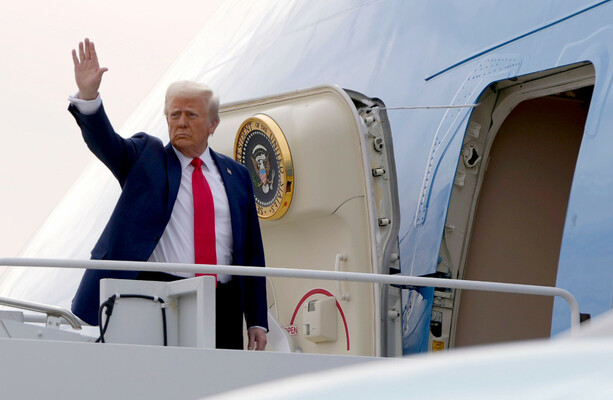Colombia Agrees to Accept Deportation Flights After Trump’s Tariff Threat
In a dramatic turn of events, Colombia has reversed it’s stance on accepting deportation flights from the United States following a tariff threat from former President Donald Trump. The decision, which came after intense diplomatic pressure, marks a important shift in the ongoing immigration negotiations between the two nations.
The standoff began when Colombia initially refused to accept deportation flights, prompting Trump to issue a stark warning. “Co-operate or else,” Trump reportedly stated, signaling his willingness to impose economic sanctions if Colombia did not comply. in response, Colombian President Gustavo Petro announced plans to raise import tariffs on U.S. goods by 25%, escalating tensions between the two countries.
Though, after days of negotiations, Colombia agreed to lift its ban on deportation flights, leading the U.S. to pause its tariff threats. “Colombia backs down and agrees to accept deportation flights after Trump’s tariff threat,” reported TheJournal.ie.
The agreement underscores the power dynamics at play in international diplomacy, particularly when economic leverage is involved. “Colombia lifts ban on deportation flights after Trump tariff threat,” noted The Irish Times.
The White House hailed the resolution as a victory, with officials claiming it reaffirmed America’s influence on the global stage. “After forcing Colombia to back down, White House claims America is respected again,” reported CNN.
This incident also serves as a cautionary tale for other nations.“co-operate or else: Trump’s Colombia face-off is warning for all leaders,” observed BBC.com, highlighting the potential consequences of defying U.S. demands.
Key Points at a Glance
Table of Contents
| Aspect | Details |
|————————–|—————————————————————————–|
| Trigger | Colombia initially refused deportation flights from the U.S. |
| Trump’s Response | Threatened to impose tariffs on Colombian imports |
| Colombia’s Reaction | Proposed raising U.S. import tariffs by 25% |
| Resolution | Colombia agreed to accept deportation flights; U.S. paused tariff threats |
| White House Statement| Claimed the agreement reaffirmed America’s global influence |
The resolution of this standoff highlights the delicate balance of power in international relations, where economic threats can swiftly alter diplomatic outcomes. As the U.S. continues to navigate complex immigration challenges, this episode serves as a reminder of the tools at its disposal—and the consequences for those who resist.
Editor’s Questions with Diplomatic Analyst Dr. Maria Gonzalez
Editor: Dr. Gonzalez, thank you for joining us. Can you explain the context behind the recent standoff between the U.S. and Colombia over deportation flights?
Dr. Gonzalez: Certainly. The standoff began when Colombia initially refused to accept deportation flights from the U.S.,citing concerns over immigration policy and human rights. This led to a stern warning from President Trump, who threatened to impose economic sanctions if Colombia did not comply. It’s a classic example of how immigration issues can escalate into broader diplomatic tensions.
Editor: How did Colombia respond to Trump’s tariff threat?
dr. Gonzalez: In response, Colombian President Gustavo petro announced plans to raise import tariffs on U.S. goods by 25%. This was a important escalation, as it directly targeted the economic relationship between the two nations. Tariffs are frequently enough used as leverage in international disputes, and this move was intended to counter Trump’s economic pressure.
Editor: what ultimately led to Colombia’s decision to lift the ban on deportation flights?
Dr. Gonzalez: After days of negotiations, Colombia agreed to lift its ban on deportation flights. This decision was likely influenced by the potential economic consequences of escalating tariffs. The U.S. paused its tariff threats in return, and both sides managed to de-escalate the situation. It’s a reminder of how economic leverage can sway diplomatic outcomes.
Editor: How has the White House framed this resolution?
Dr. Gonzalez: The White House has hailed this resolution as a victory, claiming it reaffirms America’s influence on the global stage. This framing is strategic, as it positions the U.S. as a decisive and powerful player in international diplomacy. However, it also underscores the contentious nature of U.S.foreign policy under the Trump administration.
Editor: What does this incident reveal about the state of U.S.-Colombia relations?
Dr. Gonzalez: This incident highlights the fragility of U.S.-Colombia relations, especially when it comes to immigration and economic policy. While the two nations have historically been allies, disagreements over immigration and trade can strain even the strongest partnerships. It’s a cautionary tale for both countries as they navigate future diplomatic challenges.
editor: Thank you, Dr. Gonzalez, for your insights.Do you have any final thoughts on this matter?
Dr. Gonzalez: This standoff serves as a reminder of the complex interplay between immigration, economics, and diplomacy. It also underscores the importance of negotiation and compromise in resolving international disputes. As the U.S.continues to address its immigration challenges, episodes like this will likely remain a key part of the broader conversation.
Conclusion
The recent standoff between the U.S. and Colombia over deportation flights highlights the intricate balance of power in international diplomacy. With economic threats and countermeasures playing a central role, this incident underscores the challenges of navigating immigration policy on the global stage. The resolution, while a temporary fix, serves as a lesson in the importance of negotiation and the potential consequences of defying U.S.demands.
